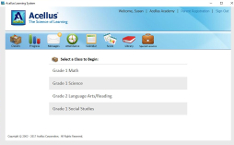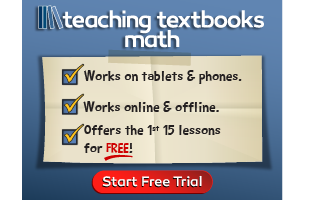Power Homeschool, the homeschool version of Acellus Academy, offers online enrollment to homeschoolers in kindergarten through twelfth grade with courses in math, science, social studies, and language arts with only a few electives available for the elementary and middle school levels. High school level offers a much broader selection of options and electives with courses for both remedial and AP levels. There are plenty of tech and career prep electives, but foreign language courses are very limited. Courses align with national standards, including the Common Core State Standards for math and language arts.
All courses are presented by experienced teachers in pre-recorded lessons that students access online from a computer or tablet with the Acellus app whenever they wish. A student may enroll in up to seven courses at a time, paying enrollment fees either by the month or the year.
Lessons are presented by teachers in brief segments, then students answer questions or solve problems based on lesson material. Questions are scored immediately. One issue that cropped up for me from time to time was that questions after a lesson segment sometimes addressed topics not covered until a later segment.
Pre-tests at the beginning of most courses help establish prior student knowledge. A mid-term exam and a final exam are provided within each course to ensure that students master the material before moving forward. Some courses include more-frequent unit exams as well.
Students will usually complete a number of segments each session. Most video segments are shorter than ten minutes. Questions vary in the amount of time required. Some might be as brief as a set of five multiple-choice questions while others (usually at higher grade levels) might include a lengthy reading passage with questions. Segments tend to be longer as students move up through grade levels. All reading material is presented online, even for high school courses, so students do not need to obtain additional books.
In addition to video instruction and questions, there are Special Lessons for each course. Students can access these from the student dashboard, but parents can also access them from their own dashboard, getting access to printable versions of both teacher and student components of each lesson. Some of these special lessons are vital to courses. They might consist of additional instruction with illustrations (especially for math and science); composition activities or spelling lessons for language arts; or maps, illustrations, projects, presentations, or debate topics for social studies. Special lessons for science courses sometimes include investigations or observations. While there are quite a few hands-on activities for fourth-grade science, the high school General Biology course has very few—not enough to qualify it as a lab course. Not having looked at all science courses, I can't generalize about hands-on activities or lab work.
Special lessons are designed by each teacher, so they vary a great deal from course to course in style, purpose, and the number of them included. Parents need to assign the special lessons since they are not scheduled into the regular class work, so don't forget to check these out and choose which you will use.
Power Homeschool is an adaptive program. It incorporates complex algorithms to adapt material for students with a built-in system called "prism diagnostics." I could not see “behind the scenes” to identify when or how this might be happening, so my explanation of the adaptations are based on information from Power Homeschool. They claim to have done a great deal of research to create and continually improve the program.
For example, because so many students begin classes with critical gaps in their background knowledge, Power Homeschool occasionally presents what they call “swiss cheese problems” that identify deficiencies so that the system can adapt to fill gaps. Power Homeschool also uses context-sensitive adaptation. If a student misses a math problem, the system looks at the type of error and addresses that particular type of error rather than just the solution to the problem. Click here to watch a video that explains how this works.
By looking at the lists of available courses (e.g., remedial language arts and math courses for high school), you can tell that Power Homeschool was designed to also help struggling students. While I cannot speak from experience about using these courses with students who need remedial work, Power Homeschool has a successful track record with such students. However, it is important to note that there are also Advanced Placement courses available as well. Courses I reviewed were for the average student, and, overall, they seemed relatively easy rather than challenging.
Just as in classrooms, some Power Homeschool teachers are more effective or more appealing than others. Many of the teachers in the primary grades seem very upbeat and encouraging, even over the top sometimes in their attempts to engage students. The fourth-grade science teacher is very lively and engaging even while she’s teaching something as mundane as the classification system, and the Algebra 1 teacher is also outstanding. In some courses, teachers recap the main concepts at the end of each lesson. This is an excellent feature that many teachers would do well to imitate.
Lessons and questions in the early grades include lots of repetition. This might be great for some students but excessive for others. For example, students might be asked to spell the same word three or more times in an exercise with only twenty or so words.
Students can work through courses independently, for the most part, something many parents will appreciate. The system tracks which lessons have been completed by students.
The teacher/parent interface is easy to use. Student work is automatically graded. Cumulative progress is available in the gradebook. Time worked is also logged by the system. Reports and transcripts can be accessed and printed from the teacher/parent interface.
As far as the treatment of religion, Power Homeschool is a secular program, and it can be used through charter schools. They say that they try to be sensitive to religious topics since some religious schools use their curriculum. In the high school World History I course, students learn objective information about Judaism, Islam, Christianity, Buddhism, Hinduism, ancient Egyptian religious practices, and Chinese philosophies without opinions supporting or denying any of them. However, one of the thorniest issues is evolution, and the treatment of that topic in high school biology strongly presents an evolutionary perspective. I expect that some other Power Homeschool courses might present other issues for those with strongly held religious beliefs, problems that tend to crop up in government-funded schools.
In addition to problems related to religious beliefs, there have been many complaints from parents who have encountered material that they say doesn't reflect present-day attitudes about diversity and inclusion. Here is one example. Acellus has been quick to respond to some of the complaints, particularly those of progressives, by immediately changing their course material.
For my review, I set up three students: a first grader, a fourth grader, and a ninth grader. Following are some particular observations regarding courses for each of those grade levels.
First Grade
Teachers at first-grade level spend a bit of time trying to motivate students with encouragement as well as discussions about why students need skills such as math and reading.
Reading instruction in first grade has a strong phonics base, but it also teaches basic sight words as well as reading skills such as comprehension and identifying the main character, the setting, or the conflict. Lessons are designed to build a solid foundation for reading skills.
In first grade, the social studies course covers some topics most children will already understand—topics such as community helpers and the need for rules. Among other topics taught are helping others at school and in the family, saying the Pledge of Allegiance, communities and neighborhoods, signs and safety, reading a calendar, and following directions. They also learn about a few famous people from American history. Since instruction was designed for group classes at schools, distinctions made between things typically done at home or at school might be confusing and inaccurate for homeschoolers.
Science lessons offer a broad introduction to many topics with lots of illustrations and some hands-on activity. Math builds a solid foundation in beginning math concepts and arithmetic, often using hands-on demonstrations and visual representations.
Fourth Grade
The fourth-grade language arts course covers phonics, reading, literary analysis, vocabulary, grammar, punctuation, usage, and composition, although grammar receives relatively little attention. The course reviews phonics in detail but with an emphasis on using phonetic knowledge for spelling. Spelling lessons are presented under the special lessons tab as well as through videos.
Fourth-grade math starts with a review of place value and simple addition and subtraction. It reviews multiplication facts with a game every so often. It introduces division and fractions in the first half of the course, adding decimals, introductory geometry, factors, and prime numbers in the second half. It also teaches concepts such as rounding, estimation, mental problem-solving, measurement, money, and time-telling. There is no cumulative review either within lessons or on unit quizzes, but mid-term and final exams each assess students on all that has been taught up to that point.
Ninth Grade
The Algebra 1 course I selected is great, largely due to the outstanding teacher. He explains and demonstrates concepts thoroughly, helping students think through each process. These segments were enjoyable to watch, something that can rarely be said about an algebra class.
The Biology course is well presented, but it devotes a great deal of time to evolution, genetics, and related topics. In fact, almost everything taught in the second semester is taught in relation to or in support of the theory of evolution—topics such as cells, cellular reproduction, genetics, DNA, RNA, genetic mutations, Darwin, inherited variations, evidence for evolution, natural selection, and vestigial structures. While the Next Generation Science Standards require that evolution be taught as one of the key underlying theories for learning science, this course prioritizes that topic more than do most general biology courses.
I also selected U.S. History as one of my ninth-grade courses. This course covers a huge amount of material beginning with the Enlightenment and its influences on the formation of our country and continuing up through World War II. It covers this huge swath of history by taking a topical approach rather than attempting comprehensive coverage. Special lessons for this course have students dig deeper to prepare presentations on particular topics; while many of these are supposed to be oral presentations to a class group, they could be used for oral or written presentations by homeschoolers working on their own. Likewise, the many debate topics could also be used for the presentation of position papers or speeches rather than debates.
The English course combines literature, grammar, vocabulary, and composition skills, but lessons themselves require no actual composition work. Composition assignments are in the Special Lessons. For literature, short stories and literary excerpts are used rather than complete novels so that all course components can be included within the lesson material.
Summary
Power Homeschool courses have done a nice job coupling video lessons presented by excellent teachers with online student responses to ensure learning. Courses keep students engaged because teaching segments are short and questions follow immediately. Students have to pay attention to answer the questions. In spite of some shortcomings such as lack of cumulative review in math and lack of full lab activity options for high school science, those looking for secular course material that aligns with national standards might find Power Homeschool an option worth considering. However, content issues continue to be a problem even a number of years after I wrote my initial review.









